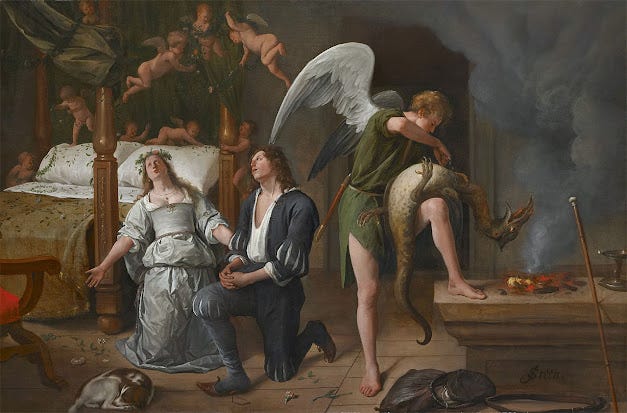Finally reading the Apocrypha
Svithe #1—Tobit
.
I first heard of the Apocrypha while reading the D&C as a teenager. That served to entice me but it also kept me away from reading it myself all these years. It sounded awesome and interesting but to read it was essentially saying to God that I knew all there was to know about the Bible, Book of Mormon, D&C, and the Pearl of Great Price. Which, at minimum, was arrogant.
However, I was reading plenty of other nonscriptural stuff. The idea that I can read Piers Anthony but not Apocrypha because I don't fully understand Isaiah yet is the sort of broken thinking that can happen when you only engage with your religion so far.
I still don't know the canon as well as I could (not shall I ever) but, for some reason, today, December 4, I decided once again to start and, because I was not trying not to annoy my wife, I sat and started reading it. Then the 5yrold asked me to read to her and, as Lady Steed finished her task, I read the first half of the first book of my Apocrypha outloud.
This is the version I'm reading.
Note: I'm not really doing research here, other than finding a painting of Tobit. Just reacting to ancient tales. This is one in a probably superoccasional series. But someday I will have read the apocrypha!
The Book of Tobit
What a fun story! Sort of a fairy tale, really. It starts with Tobit telling us about all the righteous stuff he does, but one of the righteous things (burying his fellow countrymen—they are in exile, in Nineveh—whose bodies have been thrown outside the city walls) gets him in trouble more than once. Eventually, he even goes blind and gets grumpy, even accusing his wife of stealing a goat, until he cries out in the darkness to God.
Then we switch to an omniscient narrator who quickly tells us about this woman Sarah who has been married but, each wedding night, when her husband comes unto her to consummate, a demon kills him. She lost seven husbands this way and it's making her hella depressed and the same moment Tobit is crying to God, she is too, begging for death. And, the narrator says, they both get blessed by God.
I was a bit thrown by suddenly Tobit being blind again (?) but he was. Ends up, this is the story of his and Sarah's miraculous savings and, in other words, this is where the fairy tale begins, and the hero is not Tobit but his son Tobias who has nothing but a name in common with Mr Fünke.
One day, Tobit, being blind and broke, deciding he needs the fortune he left in another city long ago, decides to send his son to pick it up. First Tobias needs a traveling companion, so he walks outside and there's this dude there who knows the way and is even related to the guy keeping Tobit's money. Fun fact: this guy is actually the angel Raphael. But the humans don't know this.
Anyway, Tobit gives Raphael a job interview and send them on their way.
One day, this fish leaps out of the water and almost eats Tobias's foot. He's scrambling to get away but Raphael tells him to catch it. Ends up, the heart and liver, when you burn them, can cast out demons. And the gall, when smeared in someone's eyes, will cure the exact form of blindness Tobit has. This is very lucky! They toss the fish's intestines, but the book doesn't state what they do with the rest of the fish. I hope they at least got a meal out of it.
They continue traveling and Raphael introduces Tobias to Sarah's parents, explaining that they're his relations and Sarah needs to get married and Tobias has the right by blood and he'll end up inheriting everything.
But, even more importantly, get this:
Do not be afraid, for she was set apart for you before the world was made. You will save her, and she will go with you. (Tobit 6:18)
Okay. That is remarkable. If Tobit were in the Old Testament proper, Saturday's Warrior would still be the law of the land. Did you know this was in the Bible? Preexistance and romance both in a single verse? Hooza.
Anyway, they show up, the marriage is on, the fish's heart and lung give them a jolly wedding night with prayer and sleeping (and, one imagines, sex), Raphael goes and picks up the rest of the money himself, eventually they head home, Tobit is healed, they try to give Raphael a ton of money and he reveals himself as an angel (ends up he never actually ate or drank, that was just a tricksy vision you were seeing!) and ascends to heaven. All the principals live to be over a hundred. It's great.
The fairy tale aspect could have been over in half the time except for the characters' prayers of lamentation and thanksgiving, and the times Tobit or Raphael preach good old-fashioned gospel principles like giving alms and taking care of people. Although they also own slave so, you know.
Fun story though. Not really like anything in the Bible as I inherited it. But the preaching was on point and the characters were likable. As fiction goes, I think I liked it better than Jonah or Job. But it's risky canonizing fairy tales.
Recommendation: Read for pleasure and edification but do not treat as literal history.
Painting: Tobias and Sarah pray on their wedding night while Raphael binds the demon. (Jan Steen)



